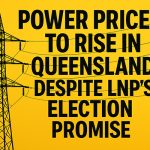
Electricity prices are set to rise across Queensland, contradicting Premier David Crisafulli’s pre-election promise to lower energy bills under a Liberal National Party (LNP) government.
Experts warn that the newly introduced “electricity maintenance guarantee” will do little to reduce energy costs, with the ongoing cost-of-living crisis remaining the primary driver behind rising electricity prices in the state.
Costs associated with energy networks and retail services in Queensland continue to increase, and experts say these pressures are unlikely to ease for several years, even as interest rates gradually fall.
Despite the mounting burden on households and businesses, Queensland’s Treasurer and Energy Minister David Janetzki has confirmed that the upcoming state budget will not include any energy rebates. Additionally, the government will not impose coal price caps on state-owned power generators—measures that previously helped lower wholesale energy prices.
No Immediate Relief
“Our commitment to easing energy prices hasn’t changed,” said Mr Janetzki. “Labor failed to provide rebates beyond last year’s budget, and we’re focused on long-term solutions.”
The LNP is instead promoting other cost-of-living measures, such as permanently reduced public transport fares, eliminating stamp duty for first home buyers, scrapping the so-called “patients’ tax,” and introducing the electricity maintenance guarantee.
However, critics argue these initiatives won’t shield Queenslanders from rising power bills.
In 2022, the previous Labor government intervened by capping coal prices when energy costs soared to $180 per megawatt-hour. But the Australian Energy Regulator has since projected that electricity prices in Queensland will rise by up to 3.7% for households and 8.5% for small businesses in 2025—an increase of roughly $100 per megawatt-hour.
What’s Behind the Price Hike?
Tennant Reed, Director of Climate and Energy Policy at the Australian Industry Group, attributed the surge to both wholesale and network costs. He noted that retailers are passing on additional costs as they struggle with a growing number of financially stressed customers.
“Retail costs make up 6–16% of a typical electricity bill, and they’re rising by 35% according to the regulator,” Reed said. “Retailers are dealing with more debts, more hardship cases, and spending more on customer support.”
This, he said, makes the cost-of-living crisis the largest factor behind Queensland’s energy price increases.
Origin Energy Price Hike
Major energy provider Origin Energy has already informed customers of increased charges effective August 1, with daily supply fees rising by nearly 5 cents per day. The company compared the increase to rising costs in groceries, fuel, and insurance, attributing it to operational costs and sourcing electricity.
Meanwhile, Queensland households are expected to receive $75 quarterly energy subsidies from the federal government starting July 1—a measure some see as insufficient in the face of mounting bills.





